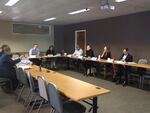
The Fiscal Advisory Committee debated four mandatory questions about the fiscal impact for Bullseye and Uroboros, but also smaller specialty makers.
April Baer / OPB
State regulators talked about new limits on art glass emissions today. But the hearing turned emotional as the wife of the owner of Oregon’s art glass leader made a surprise appearance.
Nobody knew Lani McGregor was coming to Friday's meeting of the DEQ fiscal advisory committee, which convened to look at new limits for Oregon’s celebrated art glass industry. She's the director of Bullseye Projects, the company's fine art arm, and the wife of founder Dan Schwoerer.
Bullseye Glass was nearing the end of a 10-day moratorium on unfiltered glass production. Bullseye’s controller, Eric Durrin, had planned to attend the committee meeting, but he couldn’t because of last-minute talks with DEQ.
"If we did not sign the agreement today," McGregor explained, "We would be issued another cease and desist order."
Indeed, Oregon Gov. Kate Brown directed DEQ to do just that only hours after McGregor spoke.
Bullseye's moratorium on unfiltered glass production is now extended through June 8, aimed at heading off heavy emissions of toxic metals.
McGregor wanted a seat at the committee table to represent the company but was denied. DEQ's Joe Westersund explained that the agency invited glassmakers and neighborhood environmental groups to participate in the committee, but it wasn't an open invitation.
"Members of the committee need to be appointed by the head of DEQ," Westersund said. "If I'd been asked last night could we substitute a different person, we could have made that work. But being confronted at the beginning of the meeting, saying, 'Hey, we have someone else, can we substitute them?' ... I wasn't ready to make that last minute change without talking to our rule making process people about whether we can do that."
Today's committee work was about policy, not enforcement. But during the public comment period, McGregor appealed to the group on Bullseye's behalf just the same. She said Bullseye is trying to get pollution controls installed.
"I'm sorry that you can't give us more time or more direction or any assistance," said McGregor, crying as she spoke. "But all of us here are going to do the right thing, and we're going to do the right thing if it kills us."
Much of the committee's conversation focused on the question of whether glass makers can remain in business if they avoid use of metals. Several makers, large and small, agreed that was not an option that would let them sustain their business model.
Amanda Jarman represented the Eastside Portland Air Coalition at the meeting. She lives near Bullseye and encouraged DEQ regulators to consider not just business costs and employment statistics, but also human health costs.
"We know treating one case of childhood asthma costs $3,300 dollars a year," Jarman said. "Multiply that across the neighborhood. We're talking about one illness."
DEQ did not comment on the new cease and desist order, except to confirm no agreement that would allow Bullseye to restart production had been reached.
The art glass community has sent hundreds of messages to the governor's office, asking her to help Bullseye stay in business.
